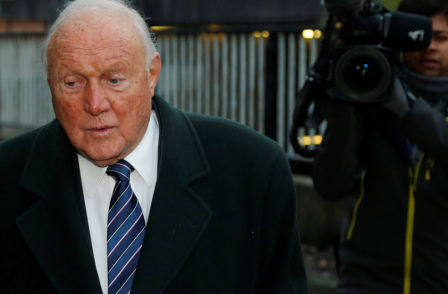
The Press Complaints Commission has said that a Daily Mirror story headlined ‘Stuart Hall judge visited gay brothel’ did not breach the privacy of Anthony Russell QC.
Dr Nicholas Russell complained on behalf of his brother that the story breached clause 12 (Discrimination) and Clause 3 (Privacy) of the Editors’ Code. The complaint was dismissed on both counts.
The front page story noted that the judge resigned his position as a recorder in 1996 following the publication of allegations that he had visited a "gay brothel".
Dr Russell said the story insinuated that his brother's sexual orientation was relevant to, or had influenced, his judgement in the sentencing of Hall. The coverage was "grossly offensive, intruded into his brother's privacy and referred to his brother's sexual orientation in pejorative terms" – he claimed.
The PCC said that this was “an extremely finely balanced decision” but it concluded that the Mirror was “entitled to bring to its readers' attention the fact that a serving judge who was the subject of present controversy had previously had cause to resign from a judicial post”.
It added: “The direct cause of the judge's resignation was the visit to an establishment which was allegedly the site of sexual activities that were regarded, at least at the time of the original incident, as worthy of comment.
“While the commission made clear that it might have taken a different view had the report included gratuitous sexual details, which would clearly have been irrelevant to a report of the circumstances of the resignation, it concluded that the newspaper had been entitled to publish the fact that the establishment had catered for gay men.
“The Commission had reservations about the manner in which the material had been presented, and in particular the prominence given to the nature of the establishment, but Clause 12 (ii) does not provide for the Commission to uphold a complaint solely based on the prominence given to information in a story which might be held to identify an individual's sexual orientation.
“The Commission understood the complainant's position that republishing the allegations in this context constituted a pejorative and prejudicial reference to the Judge's sexual orientation. It noted, however, that the article had recounted the incident in a factual manner, without ridiculing the judge's sexuality or employing offensive terms. It concluded that the article contained no "prejudicial or pejorative reference" to the Judge's sexual orientation. There was no breach of Clause 12 (i).
“Finally, the coverage contained minimal details about the allegations, which had been previously published, and no further information or speculation that could be said to relate to the complainant's private life.”
Email pged@pressgazette.co.uk to point out mistakes, provide story tips or send in a letter for publication on our "Letters Page" blog
